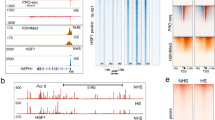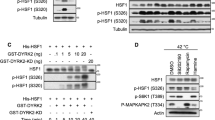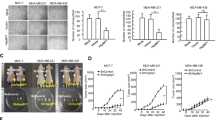Abstract
Heat-shock proteins (HSP) 90 exert a relevant role in the survival and response to therapy of many neoplastic cell types. Here, we show that the promoter of hsp90α gene, that encodes the inducible form of HSP90, is regulated by nuclear factor-κB (NF-κB) activity. Indeed, we found that NF-κB factors bound to one of the two putative consensus sequences present in the hsp90α-flanking region; mutation of such motif hampered the phorbol-myristate-13-acetate-stimulated expression of a luciferase reporter gene under the control of the hsp90α promoter. Furthermore, the downmodulation of NF-κB (p65) levels by a specific small interfering (si) RNA resulted in reducing the levels of endogenous HSP90α protein. These findings disclose a previously unrecognized mechanism that contributes to connect NF-κB factors and HSPs in cell defence machinery.
This is a preview of subscription content, access via your institution
Access options
Subscribe to this journal
Receive 50 print issues and online access
$259.00 per year
only $5.18 per issue
Buy this article
- Purchase on Springer Link
- Instant access to full article PDF
Prices may be subject to local taxes which are calculated during checkout



Similar content being viewed by others
Accession codes
References
Broemer M, Krappmann D, Scheidereit C . (2004). Requirement of Hsp90 activity for IκB kinase (IKK) biosynthesis and for constitutive and inducible IKK and NF-κB activation. Oncogene 23: 5378–5386.
Chen G, Cao P, Goeddel DV . (2002). TNF-induced recruitment and activation of the IKK complex require Cdc37 and Hsp90. Mol Cell 9: 401–410.
Field N, Low W, Daniels M, Howell S, Daviet L, Boshoff C et al. (2003). KSHV vFLIP binds to IKK-γ to activate IKK. J Cell Sci 116: 3721–3728.
Karin M, Greten FR . (2005). NF-kappaB: linking inflammation and immunity to cancer development and progression. Nat Rev Immunol 5: 749–759.
Maiuri MC, Tajana G, Iuvone T, De Stefano D, Mele G, Ribecco MT et al. (2004). Nuclear factor-kappaB regulates inflammatory cell apoptosis and phagocytosis in rat carrageenin–sponge implant model. Am J Pathol 165: 115–126.
Mitsiades CS, Mitsiades NS, McMullan CJ, Poulaki V, Kung AL, Davies FE et al. (2006). Antimyeloma activity of heat shock protein-90 inhibition. Blood 107: 1092–1100.
Morimoto RI, Sarge KD, Abravaya K . (1992). Transcriptional regulation of heat shock genes. A paradigm for inducible genomic responses. J Biol Chem 267: 21987–21990.
Pearl LH, Prodromou C . (2003). Structure and functional relationships of Hsp90. Curr Cancer Drug Targets 3: 301–323.
Pittet JF, Lee H, Pespeni M, O'Mahony A, Roux J, Welch WJ . (2005). Stress-induced inhibition of the NF-kappaB signaling pathway results from the insolubilization of the IkappaB kinase complex following its dissociation from heat shock protein 90. J Immunol 174: 384–394.
Richter K, Hendershot LM, Freeman BC . (2007). The cellular world according to Hsp90. Nat Struct Mol Biol 14: 90–94.
Romano MF, Lamberti A, Bisogni R, Garbi C, Pagnano AM, Auletta P et al. (1999). Amifostine inhibits hematopoietic progenitor cell apoptosis by activating NF-kappaB/Rel transcription factors. Blood 94: 4060–4066.
Tanaka T, Nasmyth K . (1998). Association of RPA with chromosomal replication origins requires an Mcm protein, and is regulated by Rad53, and cyclin- and Dbf4-dependent kinases. EMBO J 17: 5182–5191.
Whitesell L, Lindquist SL . (2005). HSP90 and the chaperoning of cancer. Nat Rev Cancer 5: 761–772.
Young JC, Agashe VR, Siegers K, Hartl FU . (2004). Pathways of chaperone-mediated protein folding in the cytosol. Nat Rev Mol Cell Biol 5: 781–791.
Author information
Authors and Affiliations
Corresponding author
Rights and permissions
About this article
Cite this article
Ammirante, M., Rosati, A., Gentilella, A. et al. The activity of hsp90α promoter is regulated by NF-κB transcription factors. Oncogene 27, 1175–1178 (2008). https://doi.org/10.1038/sj.onc.1210716
Received:
Revised:
Accepted:
Published:
Issue Date:
DOI: https://doi.org/10.1038/sj.onc.1210716
Keywords
This article is cited by
-
Zinc is a key regulator of gastrointestinal development, microbiota composition and inflammation with relevance for autism spectrum disorders
Cellular and Molecular Life Sciences (2022)
-
The Keap1 signaling in the regulation of HSP90 pathway
Cell Stress and Chaperones (2022)
-
Long non-coding RNA NKILA regulates expression of HSP90α, NF-κB and β-catenin proteins in the MCF-7 breast cancer cell line
Molecular Biology Reports (2021)
-
The functions and regulation of heat shock proteins; key orchestrators of proteostasis and the heat shock response
Archives of Toxicology (2021)
-
Complex structure of human Hsp90N and a novel small inhibitor FS5
Nuclear Science and Techniques (2020)



